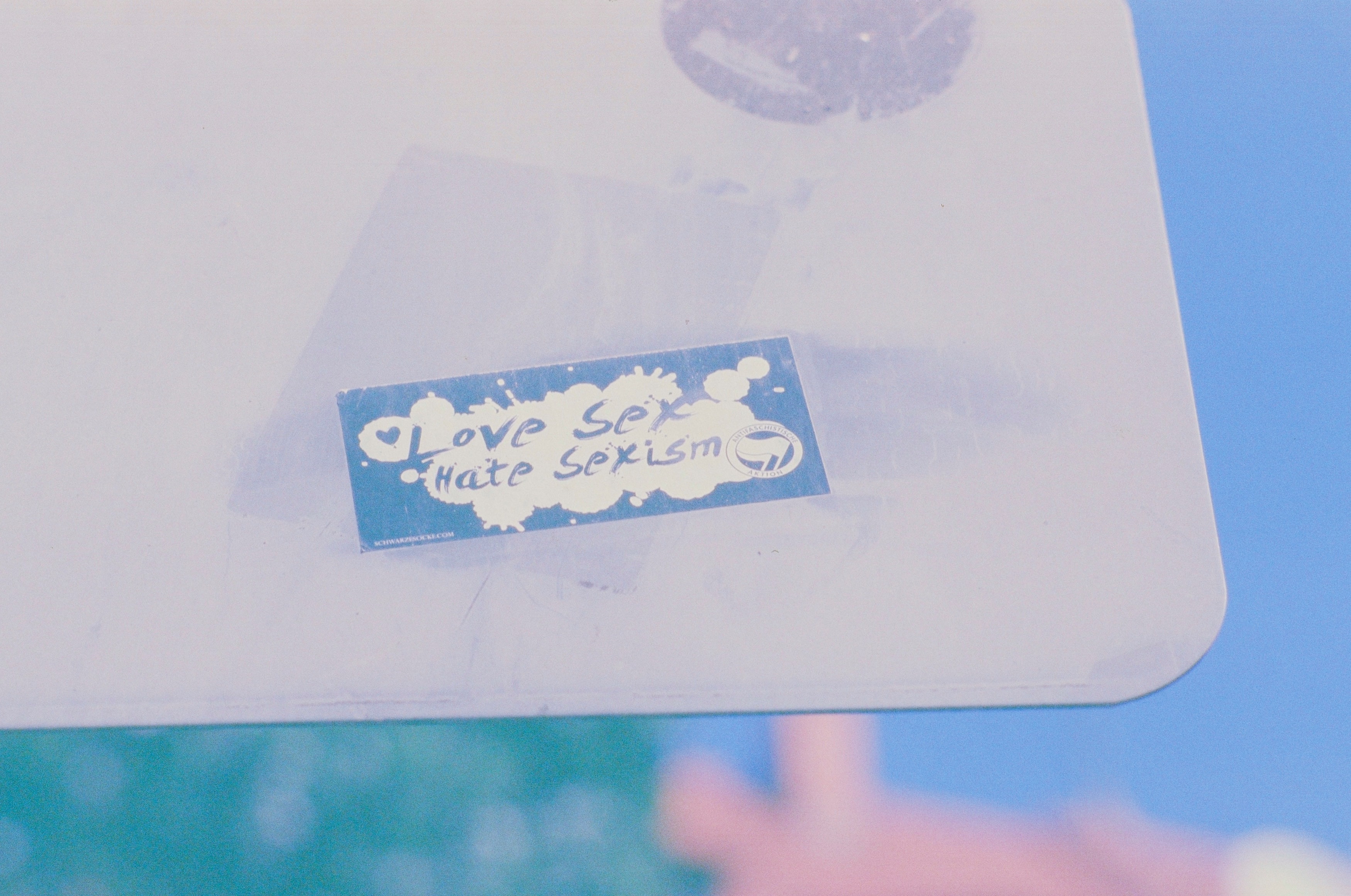In the early 2010s, feminism did an absolutely wild thing – it became popular. Between the embrace of girl power narratives in media texts, the barrage of feminist-branded merchandise promoted by Buzzfeed listicles, and the multitude of social media pages dedicated to intersectionality and body positivity, feminism became the thing to do and a feminist became the thing to be. No longer a movement to scorn or an identity to shirk, feminism transformed into something widely embraced by both the millennial and Gen Z generations. With approximately 61% of U.S. women claiming a feminist identity,1 the social movement and political theory has achieved a more widespread reach than it ever has before. While there cannot be a singular explanation as to why feminism has garnered such support in the last decade, the onslaught of feminist content in popular culture points to how easily messages of gender equity are proliferated. The majority of already-identifying feminists, according to Pew Research, belong to these younger generations, indicating that they are feminism’s future.2
"The barrage of feminist content in pop culture was unavoidable. In some ways, it seemed like a dream come true."
Accompanying, perhaps even prompting, this popularity is celebrity engagement with feminism.3 Solange Knowles, Ashley Judd, Lizzo, Joseph Gordon-Levitt, Emma Watson, Prince Harry, Meghan Markle, Lin Manuel-Miranda, Laverne Cox, Amy Poehler, and the cast of the Avengers (save for Robert Downey Jr. and Chris Pratt4) publicly identify as ardent feminists and, to varying degrees, have advocated for gender equality on an international stage. In 2013, singer and entertainer John Legend, famously said, “All men should be feminists. If men cared about women’s rights, the world would be a better place. We are better off when women are empowered – it leads to a better society.”5 Within the last ten years, feminism became unprecedentedly cool. While this may indicate shifting tides around gender relations and power dynamics in the U.S. (something that I am too often optimistic about), I argue that we should proceed with an abundance of caution as feminism continues to be all the rage.
In her book, Empowered: Popular Feminism and Popular Misogyny, Sarah Banet-Weiser names this iteration of feminism “popular feminism.”6 Working through the economy of visibility, which she describes as a set of tactics that profiteer off representational diversity, Banet-Weiser explains that popular feminism’s emergence is a direct descendant of postfeminist culture. Postfeminism can be described as the neoliberal sensibility that displaces the need for gender equity, instead insisting that feminism has achieved everything it needed to. It equates good consumerism with good citizenry and the ideal postfeminist subject is one whose self-empowerment is practiced through economic participation. As postfeminist culture works to disavow feminism, despite having benefitted from its centuries of activism, it uses white women who successfully entered the workforce as examples of feminism’s’ irrelevance. Pointing to women’s large-scale entry into the workforce equates women’s empowerment with economic and cultural equality, as women gradually gain the agency to pursue careers and lives outside of the gendered expectations of the nuclear family.
As Diane Negra and Yvonne Tasker explain, “Postfeminism is, we contend, inherently contradictory, characterized by a double discourse that works to construct feminism as a phenomenon of the past, traces of which can be found (and sometimes even valued) in the present; postfeminism suggests that it is the very success of feminism that produces its irrelevance for contemporary culture.”7 Following postfeminist thought, if women can do almost anything that a man can do, from pursuing a lifelong career to managing their own finances, then the problem of gender inequality surely must be solved. The shift in the early 2010s, the moment when feminism culturally became popular, worked to actively recognize the state of gender relations in Western culture, all the while embracing the rhetoric of self-empowerment that is so integral to postfeminist ideology. The emergence of popular feminism paradoxically emphasized how far away true equality is, but rooted its rationale in the logics of personal responsibility.
"More often than not, the word 'intersectionality' is deployed in popular feminism as a buzzword intended to ward off critiques of its whiteness, its capitalist foundations, and its watered-down understanding of feminism."
The impetus of popular feminism, then, is recuperating some of the baggage that has historically plagued feminism. Actively working to shirk the misconceptions that feminism is disguised misandry or that feminists are a monolithic group of easily triggered snowflakes, celebrities like Emma Watson and Beyoncé publicly defended feminism and defined it (albeit in often diluted or misguided ways) for their fans.8 Pop culture’s adoption of feminism made it readily accessible to those who didn’t have direct contact with feminist grassroots efforts, nor the luxury of studying feminist theory in the academy. The barrage of feminist content in pop culture was unavoidable. In some ways, it seemed like a dream come true. Feminists of generations past had spent decades trying to convince people, particularly millennial women, that feminism is something to believe in and support. Jessica Valenti was quick to point out the dangers of popularizing feminism: “But in our haste to convince the world that feminism is a simple, shared value, it may be that we didn’t draw clear enough boundaries. Because if everyone is a feminist, is anyone?”9 Popular feminism made strides in making feminism acceptable and easy to understand, but it also lost the potency of many feminist objectives.
I do want to note that this is the manifestation of feminism that has the greatest potential to reproduce exclusionary discourse along the lines of race, gender identity, sexuality, etc. Popular feminism often falls back into the standards of a white, cishetero-patriarchal culture that foregrounds neoliberal bootstrap rhetoric, and this acquiescence demonstrates the limitations of more commodified popular feminisms, including celebrity feminism. Additionally, popular feminism is nowhere near sufficient in tackling structural inequity. Although it never claims to be powerful enough to challenge the institutional barriers to equality like feminisms past, popular feminism rarely examines the nuances of structural gender inequity around the world. Its roots lie within Western feminisms that do not consider transnational feminisms. It rarely incorporates Crenshaw’s intersectionality and when it does, popular feminism tends to rely on a shallow understanding of how identities stack to create individual experiences.10 More often than not, the word “intersectionality” is deployed in popular feminism as a buzzword intended to ward of critiques of its whiteness, its capitalist foundations, and its watered-down understanding of feminism. Instead, popular feminism is inherently feel-good; it is fun to slap a “FEMINIST” sticker on your laptop or jam out to the latest sex-positive bop. This marketing of feminism allows for these messages to circulate in U.S. culture in a way that’s readily accessible and easy to adopt.

While it may seem that popular feminism’s issues are insurmountable, I want to stress that popular feminism is not incommensurable with more efficacious forms of feminism. If its commodification and capitalist underpinnings are significantly challenged (ideally disrupted), it does have potential as a galvanizing force. Instead of turning “feminism” and “intersectionality” into hollow buzzwords, popular feminism could usher in a new wave of political action. There is no reason why, in my opinion, popular feminism should be entirely dismissed. To completely reject popular feminism’s offerings is to create a false dichotomy of right and wrong feminism. As Roxane Gay reminds us in her work on imperfect feminism, “I am a bad feminist, I am a good woman, I am trying to become better in how I think, and what I say, and what I do, without abandoning everything that makes me human. I hope that we can all do the same. I hope that we can all be a little bit brave, when we most need such bravery.”11 Not unlike individual feminists, popular feminism is rife with imperfection but also with potential. Popular feminism has a good deal of homework to do, but it is still salvageable.
Bibliography
1 Amanda Barroso, “61% of U.S. Women Say ‘Feminist’ Describes Them Well; Many See Feminism as Empowering, Polarizing,” Pew Research Center (blog), July 7, 2020, https://www.pewresearch.org/fact-tank/2020/07/07/61-of-u-s-women-say-feminist-describes-them-well-many-see-feminism-as-empowering-polarizing/.
2 Ibid.
3 My dissertation is on the nexus of celebrity and feminism.
4 Robert Downey Jr. ironically identifies as a humanist and said in 2014 that he believes feminism is “make believe.” Rachel Semigran, “Robert Downey Jr. Calls Feminism ‘Make Believe,’” Bustle, November 7, 2014.
5 Alice Vincent, “John Legend: ‘All Men Should Be Feminists,’” The Telegraph, March 27, 2013, https://www.telegraph.co.uk/culture/music/rockandpopmusic/9956410/John-Legend-All-men-should-be-feminists.html.
6 Sarah Banet-Weiser, Empowered: Popular Feminism and Popular Misogyny (Durham: Duke University Press, 2018).
7 Yvonne Tasker and Diane Negra, introduction to Interrogating Postfeminism: Gender and the Politics of Popular Culture, ed. Yvonne Tasker and Diane Negra (Durham: Duke University Press, 2007): 8
8 Mia McKenzie, “Why I’m Not Really Here For Emma Watson’s U.N. Feminism Speech,” BGD (blog), September 24, 2014, https://www.bgdblog.org/2014/09/im-really-emma-watsons-feminism-speech-u-n/.; Adrienne Trier-Bieniek, introduction to The Beyonce Effect: Essays on Sexuality, Race and Feminism, ed. Adrienne Trier-Bieniek (Jefferson: McFarland, 2016): 1-9.
9 Jessica Valenti, “When Everyone Is a Feminist, Is Anyone?” The Guardian, November 24, 2014, http://www.theguardian.com/commentisfree/2014/nov/24/when-everyone-is-a-feminist.
10 Kimberlé Crenshaw, “Demarginalizing the Intersection of Race and Sex: A Black Feminist Critique of Antidiscrimination Doctrine, Feminist Theory and Antiracist Politics,” University of Chicago Legal Forum 1989, no. 1 (1989): 139-167, https://chicagounbound.uchicago.edu/uclf/vol1989/iss1/8.
11 Roxane Gay, “Confessions of a Bad Feminist,” May 28, 2015, Monterey, California, recorded lecture, https://www.ted.com/talks/roxane_gay_confessions_of_a_bad_feminist?language=en.
